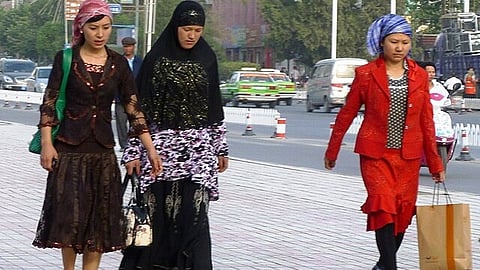
- Home
- न्यूजग्राम
- NewsGram USA
- India
- World
- Politics
- Entertainment
- Culture
- Lifestyle
- Economy
- Sports
- Sp. Coverage
- Misc.
- NewsGram Exclusive
- Jobs / Internships

This story by Filip Noubel and Laura originally appeared on Global Voices on October 23, 2025.
The plight of the Uyghurs, a Turkic-speaking ethnic group from Central Asia living in China, has long been overlooked by the general international population. However, since 2020, several countries have recognized the Uyghur genocide, changing people’s views on the region that Uyghurs call East Turkestan and that Beijing calls Xinjiang.
Today, one of the Uyghur diaspora’s missions in Europe is to maintain public and media attention on the human rights violations against Uyghurs. This includes refugee-host countries that sometimes work with Chinese authorities to return members of this community to China, where they are immediately imprisoned. The latest example occurred in February 2025 when Thailand returned forty or so Uyghurs to China.
Global Voices conducted an email interview with Dilnur Reyhan, a Uyghur sociologist living in Europe, to better understand the challenges facing the Uyghur diaspora, especially in Europe. Dilnur is the founder and president of The European Uyghur Institute and a researcher at the Oriental Institute of the Czech Academy of Sciences.
Filip Noubel (FN): Thanks to your and others’ efforts, various European countries began recognizing the Uyghur genocide in 2021. Today marks another significant milestone: the opening of the European Uyghur Institute in Paris. Why is this such a key moment?
Dilnur Reyhan (DR): The European Uyghur Institute was founded in early 2019 as a replacement of the Uyghur Student Association in France (Oghouz) that we founded in 2009. I have dreamed of having a building, a place, an Uyghur school for our children, an Uyghur center in Paris for all this time. We are an NGO operating almost entirely through volunteers and donations. Renting a building for our community at the heart of Paris is like a mission impossible. This is why this project has always seemed like an impossible dream to many people. Exactly like the campaign for recognition of the Uyghur Genocide by the French Parliament, nobody believed in our succes when we launched it, but finally we did it. For both projects, we started with a dream without having the means to achieve them other than iron will and indestructible resilience.
FN: Decolonization is a painful but necessary process that also affects colonized peoples. Do issues of decolonization, patriarchal challenges, and a culture of silence affect the exiled Uyghur community?
DR: People and nations who have suffered under long term colonial domination develop certain forms of collective traits, like the loss of confidence in one's community and in one's collective future, survival strategies and withdrawing into oneself, fear of participating in initiatives linked to one's community or initiatives perceived as ‘suspect’ by the colonial power, a permanent mistrust… Plus, China's transnational repression against Uyghur diaspora is very widespread and harsh, reinforcing the mistrust and fear among the diaspora members. This culture of fear forges a culture of silence. In this context, it is incredibly difficult to mobilize the diaspora collectively for a common project. Living during 75 years under settler colonial politics of CCP and under the classical colonialism of the Manchu and the Chinese even before, forged a particular patriarchal norm of Uyghur institutions.
FN: What about decolonizing the Chinese narrative on the Uyghurs, including within the Chinese diaspora?
DR: The colonial nature of the Sino-Uyghur relationship is not very known to the Chinese public, even among the Chinese diaspora. So far, while much of the Chinese diaspora has remained silent at best since the start of the Uyghur genocide, Chinese dissidence has spoken out against the atrocities of communist policy and does not acknowledge the colonial relationship, deliberately reducing it to a question of simply human rights and ‘minority rights.’ Reducing a people to the status of a ‘minority’ is a way of validating and legitimizing colonization. However, to solve the underlying problem, we must address its root cause, which is Chinese colonialism in Uyghur lands. Decolonizing minds begins with recognizing the colonial relationship between China and East Turkestan.
At the European Uyghur Institute, the work of decolonizing minds is aimed not only at the Chinese-speaking public but also at the Uyghur diaspora. To this end, we are currently developing a multilingual web media project, particularly in Chinese, aimed at young progressives in the Chinese diaspora, alongside broadcasts in Uyghur, English, and French.
FN: You also work with young Uyghurs who are in exile. What are their main challenges, and how would you describe their identity?
DR: The younger generation that grew up in the diaspora gives us a lot of hope. They are progressive, feminist, and humanist youth. They want to learn about Uyghur history, they are fluent in several languages besides the language of their respective countries, are studying in various fields, and are connected to the youth of their countries and their times. They want to be able to connect diaspora activism with the institutions of their countries, especially in the West; they are much more innovative and competent.
In 2024, the European Uyghur Institute organized the first-ever International Secular Uyghur Youth Congress, bringing together around a hundred young Uyghurs from around the world in Paris for a week to discuss topics like colonialism, feminism, antiracism, and artivism. Since then, these young people have organized several similar gatherings on a smaller scale, trying to innovate new ways of activism within the diaspora. They are also much more sensitive to the colonial question and decolonization.
[VP]
Suggested Reading:
